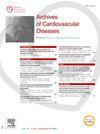巨噬细胞efferocysis受体在缺血后心肌重构中的作用
IF 2.3
3区 医学
Q2 CARDIAC & CARDIOVASCULAR SYSTEMS
引用次数: 0
摘要
急性心肌梗死(AMI)后,心肌细胞的大量损失引发强烈的炎症反应和进行性不良重构,最终导致心力衰竭。虽然炎症是梗死心脏修复和功能的主要决定因素,但如果不加以控制,它会直接引发病理性重构。巨噬细胞(Mps)在缺血心肌的炎症和修复阶段都起着重要作用,两者之间的平衡控制着疾病的结局。心脏巨噬细胞群体是异质的,包括胚胎来源的常驻心脏巨噬细胞(RCM)和单核细胞来源的巨噬细胞(MDM)。RCM具有很强的免疫调节和修复功能,这主要是由于其吞噬死细胞的efferocytosis能力,以控制炎症和组织重塑。RCM的特点是高表达efferocytosis受体,如VSIG4 (V-Set和Immunoglobulin Domain Containing 4)和TIMD4 (t细胞免疫球蛋白和粘蛋白Domain Containing 4)。然而,胞饮、巨噬细胞可塑性和组织修复之间的分子机制尚不清楚。目的探讨VSIG4和TIMD4 efferocytosis受体在心脏修复过程中巨噬细胞依赖性efferocytosis中的作用。方法采用冠状动脉左前降支永久性结扎法致小鼠急性心肌梗死。采用超声心动图和免疫组织化学评估心功能和重构。在原代巨噬细胞中研究巨噬细胞的efferocytosis以及efferocytosis对巨噬细胞信号通路、分泌和重编程的影响。通过单细胞RNA测序,我们发现VSIG4表征了心脏组织中RCM的一个特定子集(图1)。VSIG4缺乏会使缺血后的心功能和重构恶化,通过心肌内注射重新引入VSIG4+ RCM可使其恢复(图2)。在体外,VSIG4和TIMD4受体似乎不仅赋予Mps增加的死细胞结合能力,而且还唤起AKT和AMPK途径并触发可溶性因子的分泌(图3)。综上所述,我们的数据表明TIMD4+ VSIG4+ RMCs是缺血后心脏愈合的关键调节因子,可能通过其增强的effocysis能力,也可能通过其调节effocysis刺激的细胞因子分泌。本文章由计算机程序翻译,如有差异,请以英文原文为准。
Role of macrophage efferocytosis receptors in post-ischemic myocardial remodeling
Introduction
After acute myocardial infarction (AMI), the massive loss of cardiomyocytes triggers an intense inflammatory response and a progressive adverse remodeling eventually leading to heart failure. Although inflammation is a major determinant of cardiac repair and function in the infarcted heart, it directly fuels pathological remodeling when unchecked. Macrophages (Mps) play an essential role in both inflammatory and reparative phases within the ischemic myocardium and the balance between the two controls disease outcome. Cardiac macrophages populations are heterogenous and encompass embryonically-derived resident cardiac macrophages (RCM) and monocyte-derived macrophages (MDM). RCM possess strong immunomodulatory and reparative functions, largely due to their efferocytosis ability—phagocytosing dead cells to control inflammation and tissue remodeling. RCM are distinguished by high expression of efferocytosis receptors like VSIG4 (V-Set And Immunoglobulin Domain Containing 4) and TIMD4 (T-cell immunoglobulin and mucin domain containing 4). However, the molecular mechanisms linking efferocytosis, macrophage plasticity, and tissue repair remain unclear.
Objective
My project aims to investigate the role of VSIG4 and TIMD4 efferocytosis receptors in macrophage-dependent efferocytosis during cardiac repair.
Method
Acute MI was induced by permanent ligation of the left anterior descending coronary artery in mice. Cardiac function and remodeling were assessed using echocardiography and immunohistochemistry. Macrophage efferocytosis and impact of efferocytosis on macrophage signaling pathways, secretion and reprogramming is investigated in primary macrophages.
Results
Using single cell RNA sequencing, we revealed that VSIG4 characterized a specific subset of RCM in the cardiac tissue (Fig. 1). VSIG4 deficiency worsen post-ischemic cardiac function and remodeling, which is rescued when VSIG4+ RCM are reintroduced by intramyocardial injection (Fig. 2). In vitro, VSIG4 and TIMD4 receptors not only seem to confer Mps with increased dead cell binding capacity but also evoke the AKT and AMPK pathways and trigger the secretion of soluble factors (Fig. 3).
Conclusion
In conclusion, our data suggest that TIMD4+ VSIG4+ RMCs are key regulators of post-ischemic cardiac healing, probably through their enhanced efferocytosis capacity but also the contribution of their regulated efferocytosis-stimulated cytokine secretion.
求助全文
通过发布文献求助,成功后即可免费获取论文全文。
去求助
来源期刊

Archives of Cardiovascular Diseases
医学-心血管系统
CiteScore
4.40
自引率
6.70%
发文量
87
审稿时长
34 days
期刊介绍:
The Journal publishes original peer-reviewed clinical and research articles, epidemiological studies, new methodological clinical approaches, review articles and editorials. Topics covered include coronary artery and valve diseases, interventional and pediatric cardiology, cardiovascular surgery, cardiomyopathy and heart failure, arrhythmias and stimulation, cardiovascular imaging, vascular medicine and hypertension, epidemiology and risk factors, and large multicenter studies. Archives of Cardiovascular Diseases also publishes abstracts of papers presented at the annual sessions of the Journées Européennes de la Société Française de Cardiologie and the guidelines edited by the French Society of Cardiology.
 求助内容:
求助内容: 应助结果提醒方式:
应助结果提醒方式:


